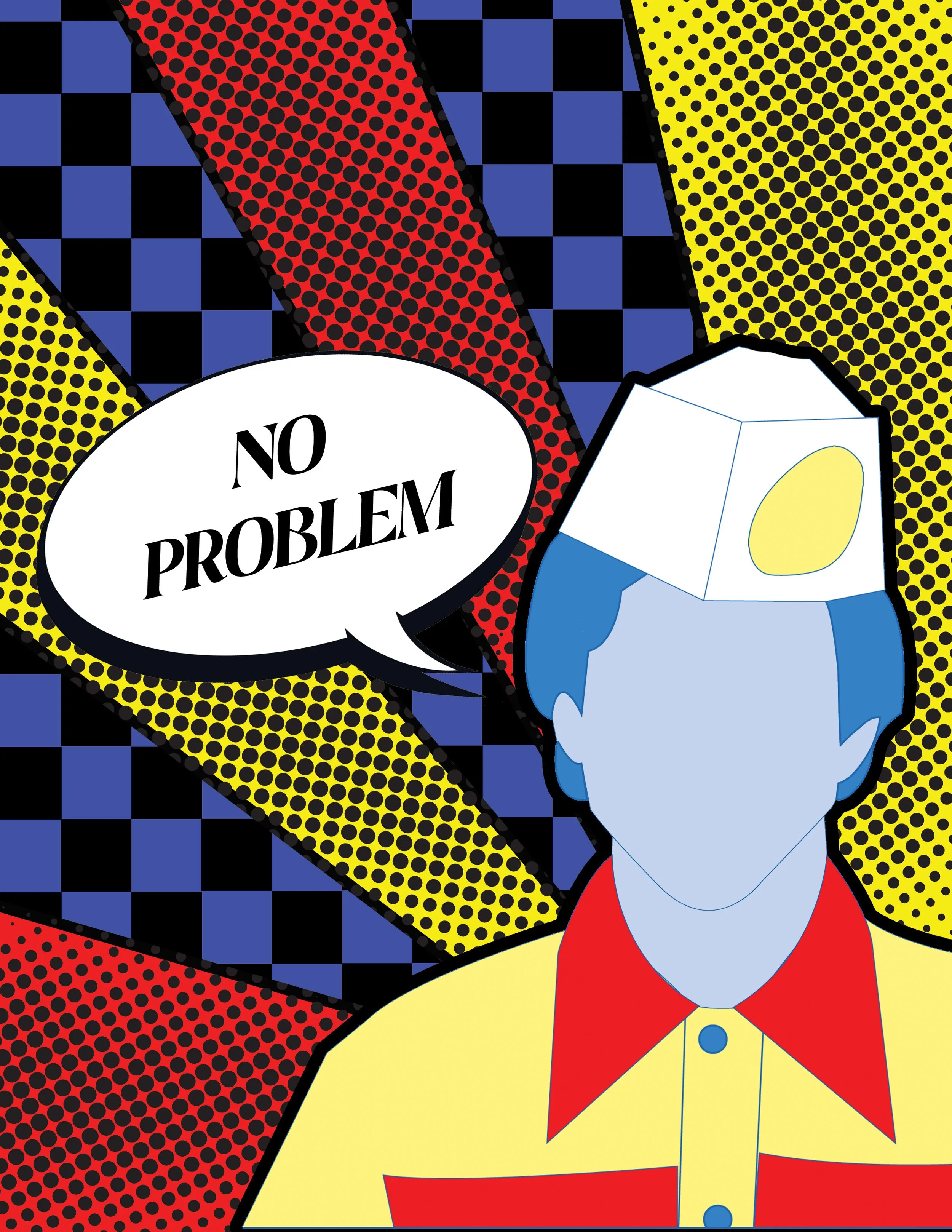The Problem With Saying "No Problem"
The Problem With Saying “No Problem”
Written by Heather Thorn
Art by Lauren Mallett
I was 16 and fresh meat when I got my first job at a burger joint. As inexperienced as I was, I didn’t think twice when it came to ignoring my mom’s advice: Always say “You’re welcome” and never “No problem.” I was ever the angsty teenager and I fell into the throes of lunch and dinner rushes, piling drink orders, and managing a cash register—all with an eager smile on my face.
As a cashier and thus the face of a restaurant, it’s simple to become not a person but a machine. Human interactions are fine-tuned and automatic—the responses immediate, the smiles obligatory, and the small talk half-hearted. Customer service conversation boils down to a formula that sounds like this: Hi, how can I help you? Do you want fries with that? For here or to go? Cash or card? Quickly, I found myself ending each exchange by blurting out, “No problem.” Just like that, without realizing, those two words entered my vocabulary and stuck.
With experience comes thick skin calloused from the overly expectant customers who turn bold and vicious across the counter, an effect that’s multiplied when hunger enters the arena. I found myself shrinking my effort and labor in an attempt to please customers by assuring them it was “no problem” for me to serve them. I dismissed my work for others, thus minimizing the time and care I put into delivering excellent service.
My role as one of the many smiling, friendly faces at this burger restaurant was to provide prompt service, deliver food to tables, and do it enthusiastically. At the same time, my awkward refusal, even fear, to say “You’re welcome” to customers unintentionally made me a weaker worker not because I was doing less of a job, but because I was less certain of my worth as an employee. My urge to people-please and reassure customers that they weren’t an inconvenience to me made me think less of myself and in turn downplay the customer’s gratitude. In fact, “No problem” is an inherently negative phrase because it mentions a problem that’s not there, potentially implying that there was a problem or could’ve been.
Why was it so hard to say “You’re welcome”? At my first job I fell into the swing of things, blending milkshakes and refilling ketchup, and forgot about myself in the process. In the service industry, it’s easy—if not essential—to become invisible when you’re seen as a disposable worker by customers who just want their food and want it fast. In between specific orders—extra cheese, no onions, sauce on the side—the monotonous drone of working at a restaurant kicks in. In fact, it’s how I survive “clopens,” what restaurant veterans call a closing shift immediately followed by an opening shift.
I’ve been putting in elbow grease in the restaurant industry for the past four years and I now like to consider myself well-seasoned in food service. I work at a cafe in Beacon Hill where I caffeinate Bostonians part time. A few months ago, I caught myself blurting out “No problem” to a customer after delivering multiple plates to their table. From somewhere in the back of my brain amongst burger wrappers and cartons of fries, I recalled my mom’s advice.
The more I thought about it, the more I knew she was right, as mothers often are. I realized that saying “No problem” was inadvertently diminishing my work and lessening my self-worth. All of the breakfast, lunch, and dinner rushes I ever worked came flooding back. In all of my scrambling to steam milk for lattes, bring out orders, and fetch silverware and napkins, not once had I considered myself in the equation of customer service.
Along with the other robotics of customer service—all of the How can I help you?s and Would you like your receipt?s—the phrase “No problem” sat on the tip of my tongue. It was an immediate response, but I felt less of myself every time I uttered the words.
“No problem” wasn’t immediately removed from my vocabulary. It was stubborn as gum stuck to the underside of a table; it was lodged like cement in my vernacular. I started to consciously consider my response to customers when they thanked me. It took many tries, conversations, and oat milk cappuccinos, but eventually I started to accept customers’ gratitude and found myself feeling better at the end of every interaction. Now, the simple act of allowing myself to be thanked makes every shift a little sweeter.
This is a call to action no matter if you’re a well-oiled machine, lightly seasoned worker, or someone with no experience helping customers: Reassess how easily you might be dismissing yourself without realizing. You deserve recognition for your hard work, and that begins with you.
You’re welcome.

